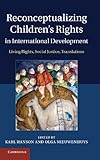Reconceptualizing children's rights in international development : living rights, social justice, translations / edited by Karl Hanson, Olga Nieuwenhuys.
Material type: TextLanguage: English Publication details: Cambridge [UK] ; New York : Cambridge University Press, 2013.Description: xiii, 302 pISBN:
TextLanguage: English Publication details: Cambridge [UK] ; New York : Cambridge University Press, 2013.Description: xiii, 302 pISBN: - 9781107031517 (hardback)
- 341.231.14-053 2 HAN
Machine generated contents note: Introduction; 1. Living rights, social justice, translations Karl Hanson and Olga Nieuwenhuijs; Part I. Living Rights: 2. Ukugana: 'informal marriage' and children's rights discourse among rural 'AIDS-orphans' in KwaZulu-Natal, South Africa Patricia C. Henderson; 3. Seeing and knowing? Street children's lifeworlds through the camera's lens Phil Mizen and Yaw Ofosu-Kusi; 4. Interdependent rights and agency: the role of children in collective livelihood strategies in rural Ethiopia Tatek Abebe; 5. Young carpet weavers on the rights threshold: protection or practical self-determination? Tom O'Neill; Part II. Social Justice: 6. Conflicting realities: the Kikuyu ethos and the CRC ethic Yvan Droz; 7. The politics of failure: street children and the circulation of rights discourses in Kolkata (Calcutta), India Sarada Balagopalan; 8. Malik and his three mothers: AIDS orphans' survival strategies and how children's rights hinder them Kristen E. Cheney; Part III. Translations: 9. Living history by youth in post-war situations Colette Daiute; 10. Inclusive universality and the child-caretaker dynamic Eva Brems; 11. Do children have a right to work? Working children's movements in the struggle for social justice Manfred Liebel; 12. Translating working children's rights into international labour law Karl Hanson and Arne Vandaele; Conclusion: 13. Children's rights and social movements: reflections from a cognate field Neil Stammers.
"Building on recent human rights scholarship, childhood studies and child rights programming, this conceptual framework on children's rights proposes three key-notions: living rights, or the lived experiences in which rights take shape; social justice, or the shared normative beliefs that make rights appear legitimate for those who struggle to get them recognised; and translations, or the complex flux between different beliefs and perspectives on rights and their codification. By exploring the relationships between these three concepts, the realities and complexities of children's rights are highlighted. The framework is critical of approaches to children as passive targets of good intentions and aims to disclose how children craft their own conceptions and practices of rights. The contributions offer important insights into new ways of thinking and research within this emerging field"--


There are no comments on this title.